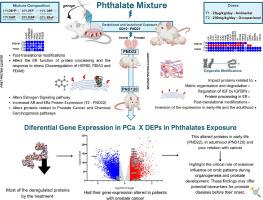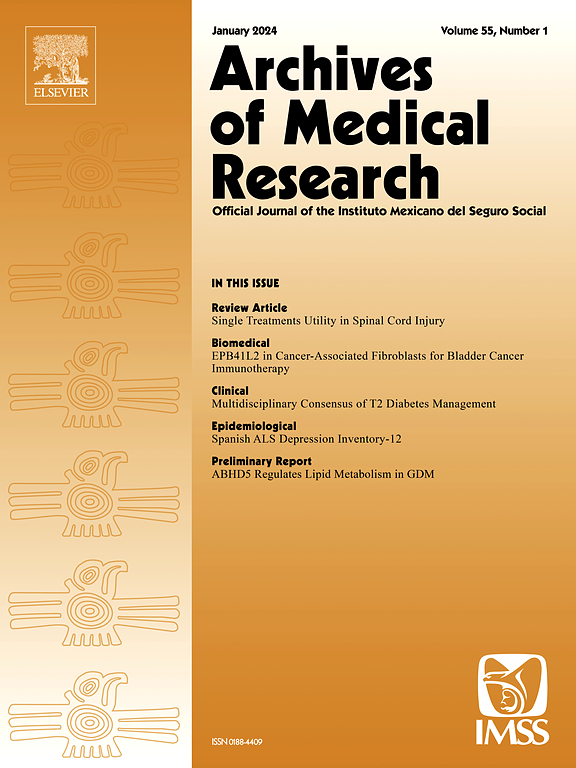Maternal Phthalate Exposure Alters Prostate Proteome in Rat Offspring: Linking Omics Insights to Prostate Cancer Risk in Humans
IF 3.4
3区 医学
Q1 MEDICINE, RESEARCH & EXPERIMENTAL
引用次数: 0
Abstract
Background
Phthalates are compounds used as plasticizers to increase the flexibility of plastics and are considered endocrine disruptors. Some studies suggest that the origin of prostate cancer (PCa) may be associated with disturbances during embryo-fetal development. Previous data showed that perinatal exposure to the same phthalate mixture (PM) used here increased the incidence of adenocarcinomas in the prostates of aged rats. Building on our earlier work, this study identifies proteins altered in the prostate proteome by exposure to a PM during gestation and lactation in rats, focusing on proteins in the human secretome and their correlation with PCa.
Methods
Pregnant SD rats were divided into three groups and treated from gestational day (GD)10 to postnatal day (PND)21. On PND22 the differentially abundant proteins in the offspring’s prostate were compared with the predicted secreted proteins in humans. Then, the abundance of selected proteins was compared among groups and enriched. Finally, a protein-protein interaction network was obtained. The resulting data were cross-referenced with data for PCa and some targets were validated by RT-qPCR and Western blot.
Results
Perinatal exposure to PM affected the endoplasmic reticulum, decreasing the amount of certain proteins crucial for protein folding and secretion, impairing secretion of several proteins important for proper prostate development. Furthermore, in silico analysis revealed that several proteins in the rat proteome are also altered in patients with PCa.
Conclusions
Our results suggest that early exposure to phthalates may modulate protein secretion, creating a microenvironment that impairs tissue development and increases susceptibility to oncogenesis.

母体邻苯二甲酸盐暴露改变大鼠后代前列腺蛋白质组:将组学见解与人类前列腺癌风险联系起来
邻苯二甲酸盐是一种用作增塑剂以增加塑料柔韧性的化合物,被认为是内分泌干扰物。一些研究表明,前列腺癌(PCa)的起源可能与胚胎-胎儿发育过程中的紊乱有关。先前的数据显示,围产期暴露于本文使用的相同邻苯二甲酸盐混合物(PM)会增加老年大鼠前列腺腺癌的发病率。在我们早期工作的基础上,本研究确定了大鼠在妊娠期和哺乳期暴露于PM时前列腺蛋白质组中的蛋白质改变,重点研究了人类分泌组中的蛋白质及其与PCa的相关性。方法将妊娠SD大鼠分为3组,从妊娠第10天(GD)至产后第21天(PND)给药。在PND22上,后代前列腺中差异丰富的蛋白质与人类预测的分泌蛋白质进行了比较。然后,在组间比较所选蛋白质的丰度并进行富集。最后,得到了蛋白-蛋白相互作用网络。将所得数据与PCa数据进行交叉比对,并通过RT-qPCR和Western blot对部分靶点进行验证。结果产前暴露于PM会影响内质网,减少某些蛋白质折叠和分泌的关键蛋白的数量,损害对前列腺正常发育重要的几种蛋白质的分泌。此外,计算机分析显示,大鼠蛋白质组中的几种蛋白质在PCa患者中也发生了改变。结论早期暴露于邻苯二甲酸盐可调节蛋白质分泌,形成损害组织发育和增加肿瘤易感性的微环境。
本文章由计算机程序翻译,如有差异,请以英文原文为准。
求助全文
约1分钟内获得全文
求助全文
来源期刊

Archives of Medical Research
医学-医学:研究与实验
CiteScore
12.50
自引率
0.00%
发文量
84
审稿时长
28 days
期刊介绍:
Archives of Medical Research serves as a platform for publishing original peer-reviewed medical research, aiming to bridge gaps created by medical specialization. The journal covers three main categories - biomedical, clinical, and epidemiological contributions, along with review articles and preliminary communications. With an international scope, it presents the study of diseases from diverse perspectives, offering the medical community original investigations ranging from molecular biology to clinical epidemiology in a single publication.
 求助内容:
求助内容: 应助结果提醒方式:
应助结果提醒方式:


